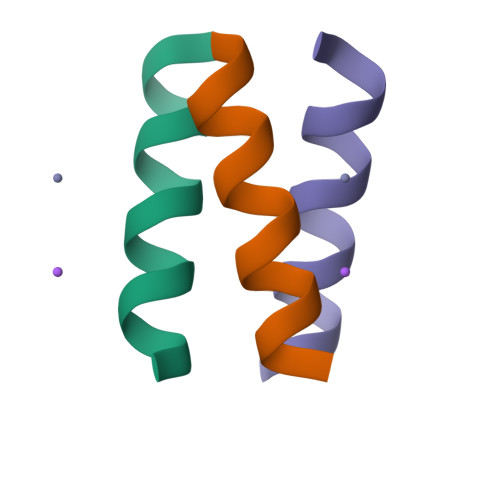Exploring amyloid formation by a de novo design
Kammerer, R.A., Kostrewa, D., Zurdo, J., Detken, A., Green, J.D., Meier, B.H., Winkler, F.K., Dobson, C.M., Steinmetz, M.O.(2004) Proc Natl Acad Sci U S A 101: 4435-4440
- PubMed: 15070736
- DOI: https://doi.org/10.1073/pnas.0306786101
- Primary Citation of Related Structures:
1S9Z - PubMed Abstract:
Protein deposition as amyloid fibrils underlies many debilitating human disorders. The complexity and size of disease-related polypeptides, however, often hinders a detailed rational approach to study effects that contribute to the process of amyloid formation. We report here a simplified peptide sequence successfully designed de novo to fold into a coiled-coil conformation under ambient conditions but to transform into amyloid fibrils at elevated temperatures. We have determined the crystal structure of the coiled-coil form and propose a detailed molecular model for the peptide in its fibrillar state. The relative stabilities of the two structural forms and the kinetics of their interconversion were found to be highly sensitive to small sequence changes. The results reveal the importance of specific packing interactions on the kinetics of amyloid formation and show the potential of this exceptionally favorable system for probing details of the molecular origins of amyloid disease.
Organizational Affiliation:
Wellcome Trust Centre for Cell-Matrix Research, School of Biological Sciences, University of Manchester, 2205 Stopford Building, Oxford Road, Manchester M13 PT, United Kingdom. richard.kammerer@man.ac.uk


















